
The World Health Organization (WHO) announced that the COVID-19 outbreak was a "pandemic" on Wednesday, sounding alarm bells in the global fight against the virus.
In response to surging infections in Europe, US President Donald Trump announced that all travel from Europe to the United States will be suspended for 30 days excluding the UK.
In light of the spread of the virus, WHO Director-General Tedros Adhanom Ghebreyesus said countries should "double down and we should be more aggressive" and focus on containment. He encouraged countries to find and test every case, prepare hospitals, train health workers and cooperate.
It’s time to give priority to disease prevention and control while taking urgent and aggressive actions to suppress infections.
The Chinese government’s capacity to mobilize the country’s resources in disease control, implement a massive quarantine and isolation regime, centralize decisions at the top, and raise public awareness has indeed paid off, as daily new confirmed cases in the country declined from thousands to 15 on Wednesday.
China’s experience in battling against the virus was made at a bitter cost in human loss. Though it’s far too early to say the virus fight is close to an end in China, China does offer the world multiple lessons. The whole human race faces the same enemy.
Due to social differences, conducting wide-scale quarantine and isolation in residential communities may not be feasible in Europe and other parts of the world. All the world faces similar problems, like shortages of medical supplies and mounting pressure on the public health care system. Local governments should get better prepared for these upcoming challenges.
Improving domestic capacity in producing masks, gloves, protective suits and other equipment while aligning with other countries for mega-capacity is a good choice. Tedros emphasized the pandemic “is not just a public health crisis, it is a crisis that will touch every sector" so that every sector and individual should gear up for the battle.
As experts said, China’s speed in tracking infections, quarantining patients and virus detection is impressive and worthy of studying. Generally speaking, it takes 4 to 7 hours to get virus test results in China. In Germany, it could be at least 24 hours. The battle against COVID-19 is a race against time, so drawing lessons to improve speed and maximize efficiency in disease prevention and control while minimizing economic and social disruption is of paramount significance.
China also demonstrated magnificent speed in infrastructure construction, especially medical facilities such as the makeshift hospitals in virus-hit cities.
Isolating patients with mild symptoms in temporary medical shelters, as Wuhan did, proved to be effective.
Classifying and assigning patients to dedicated medical facilities or temporary medical shelters in terms of their symptoms reduced the pressure on the health care system and medical resources.
Local governments in other countries should also explore measures to classify patients, avoid cross infections with family members, and reduce pressure on medical facilities.
Harnessing digital infrastructure has proven useful. China and South Korea, for example, with advanced e-commerce, mobile payment, social media and other platforms, offers its citizens multiple means to maintain contacts on the Internet, gain information and vent their emotions.
Even though classrooms are closed, students can still get access to educational resources through live streaming and online courses.
Mobile apps offer delivery services for food, drugs and other daily necessities, saving people the trouble of going outside. This is also efficient in reducing further transmissions of the virus.
One thing to note is that people in other countries should avoid bias when judging on China’s experiences and measures. For example, the New York Times reported China’s measures to lockdown Wuhan sacrificed “people’s livelihoods and personal liberties.” It praised Italy’s locking down of Milan, Venice and much of its north as an effort to “contain Europe’s worst coronavirus outbreak.” The misleading coverage shows its double standards, demonizing China’s image and distorting China’s efforts in the virus fight.
No one is outside of this global pandemic. As Tedros said, “This is everybody's business.” In this age of globalization, countries that are not on the front line of the outbreak may face similar situations and epidemics in the future. One should not panic or freak out as the disease spreads, but spend some time reflecting on China’s precedents in containing the virus and thinking about what lessons other countries can draw on, and adjust according to circumstances.


